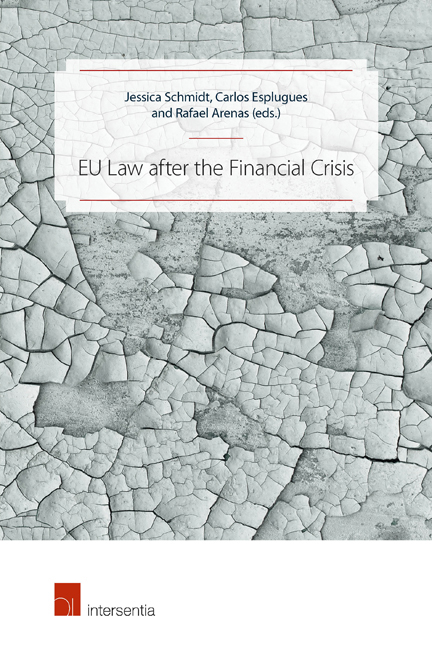Book contents
- Frontmatter
- Contents
- List of Abbreviations
- List of Authors
- Introduction
- PART I RESCUE MECHANISMS AND MONETARY POLICY
- PART II THE IMPACT OF THE FINANCIAL CRISIS ON THE BANKING SECTOR AND CAPITAL MARKETS
- PART III THE FINANCIAL CRISIS AND TAX LAW
- PART IV THE FINANCIAL CRISIS, CONSUMERS AND CONSUMER LAW
- PART V THE FINANCIAL CRISIS AND COMPETITION LAW
- PART VI THE FINANCIAL CRISIS, RESTRUCTURING AND INSOLVENCY LAW
- PART VII THE SOCIAL DIMENSION OF THE FINANCIAL CRISIS AND EU CITIZENSHIP
- PART VIII REFLECTIONS ON THE IMPACT OF THE FINANCIAL CRISIS ON THE GENERAL EUROPEAN LEGAL FRAMEWORK AND THE FUNDAMENTAL “EUROPEAN IDEA”
- Legal Certainty after the Crisis. The Limits of European Legal Imagination
- The New Role of Judges in the EU. Going Back to the Middle Ages
- Exploring the European Crisis's Political Discourse. Europe as a Consciousness, Europe as a Narrative
Exploring the European Crisis's Political Discourse. Europe as a Consciousness, Europe as a Narrative
from PART VIII - REFLECTIONS ON THE IMPACT OF THE FINANCIAL CRISIS ON THE GENERAL EUROPEAN LEGAL FRAMEWORK AND THE FUNDAMENTAL “EUROPEAN IDEA”
Published online by Cambridge University Press: 13 December 2017
- Frontmatter
- Contents
- List of Abbreviations
- List of Authors
- Introduction
- PART I RESCUE MECHANISMS AND MONETARY POLICY
- PART II THE IMPACT OF THE FINANCIAL CRISIS ON THE BANKING SECTOR AND CAPITAL MARKETS
- PART III THE FINANCIAL CRISIS AND TAX LAW
- PART IV THE FINANCIAL CRISIS, CONSUMERS AND CONSUMER LAW
- PART V THE FINANCIAL CRISIS AND COMPETITION LAW
- PART VI THE FINANCIAL CRISIS, RESTRUCTURING AND INSOLVENCY LAW
- PART VII THE SOCIAL DIMENSION OF THE FINANCIAL CRISIS AND EU CITIZENSHIP
- PART VIII REFLECTIONS ON THE IMPACT OF THE FINANCIAL CRISIS ON THE GENERAL EUROPEAN LEGAL FRAMEWORK AND THE FUNDAMENTAL “EUROPEAN IDEA”
- Legal Certainty after the Crisis. The Limits of European Legal Imagination
- The New Role of Judges in the EU. Going Back to the Middle Ages
- Exploring the European Crisis's Political Discourse. Europe as a Consciousness, Europe as a Narrative
Summary
The over-abundance of daily discursive production on Europe has recently become so overwhelming that the public can oft en understand in excess, eventually leading them to mingle reality and its representation. By mere redundancy or entropy, this exuberance of semantic significance can render what was initially intended to be signified “in-significant”. This is what some of the conventional ways of understanding Europe – as transmitted by some of its institutional representatives – could have come to mean for a growing number of citizens. Europe's apparently erratic evolution during the current systemic crisis that has been devastating it since the Great Recession of 2008 would have worsened the situation.
Using Bohm's concepts of the “implicate order – explicated order” as a metaphorical device (artefact), one aim of this chapter is to elucidate just one part of the background concerning the most resounding narrative implicit in the conventional European official discourse. One purpose is to explore the relationship between the collective representations and the social identities which mutually support each other in order to perform for a public the political and institutional structure called “Europe”, established since 1957 in the international organisation that, without exhausting its potential repertoire of semantic formulations, has been known as “European Union” since 1992. The analysis takes as a starting point the mirror relationship between words and things mediated through the subjects that produce, enunciate and control in this case the official discourse about “Europe”. As George Steiner pointed out so subtly, “any model of communication is at the same time a model of trans-lation [sic], of a vertical or horizontal transfer of significance. No two historical epochs, no two social classes, no two localities, use words and syntax to signify exactly the same things, to send identical signs of valuation and inference.”
EUROPE: AN OBJECTIVE SOCIAL SPACE FACING THE PROPHECIES OF ITS “CRISIS”
Beyond the financial disaster that devastated what in 2008 were revealed to be the astonishingly weak pillars of the world economy, a repeatedly invoked commonplace in European discourse is the term “crisis”, often a semantic wildcard whose sense tends to depend on the speaker's relative perspective.
- Type
- Chapter
- Information
- EU Law after the Financial Crisis , pp. 317 - 332Publisher: IntersentiaPrint publication year: 2016



